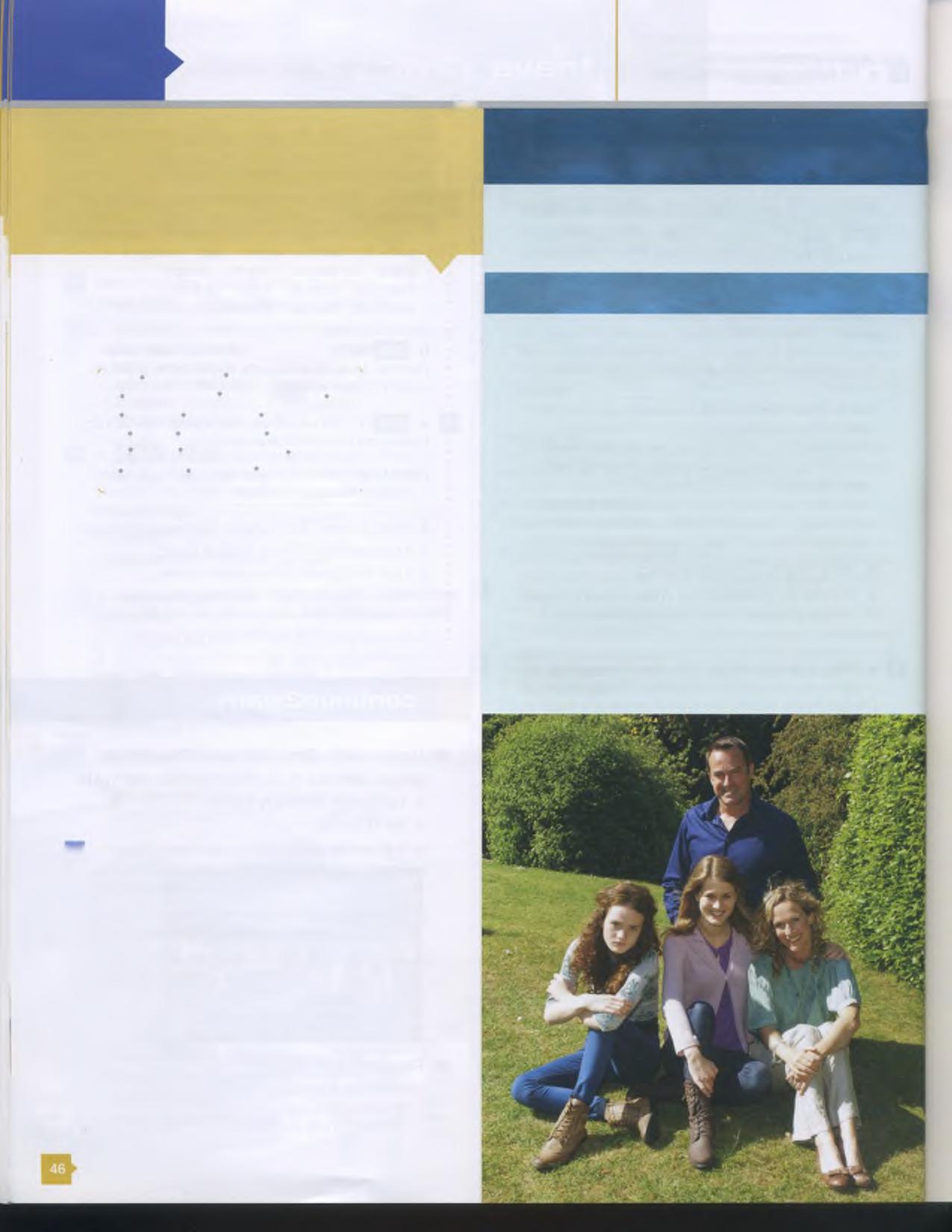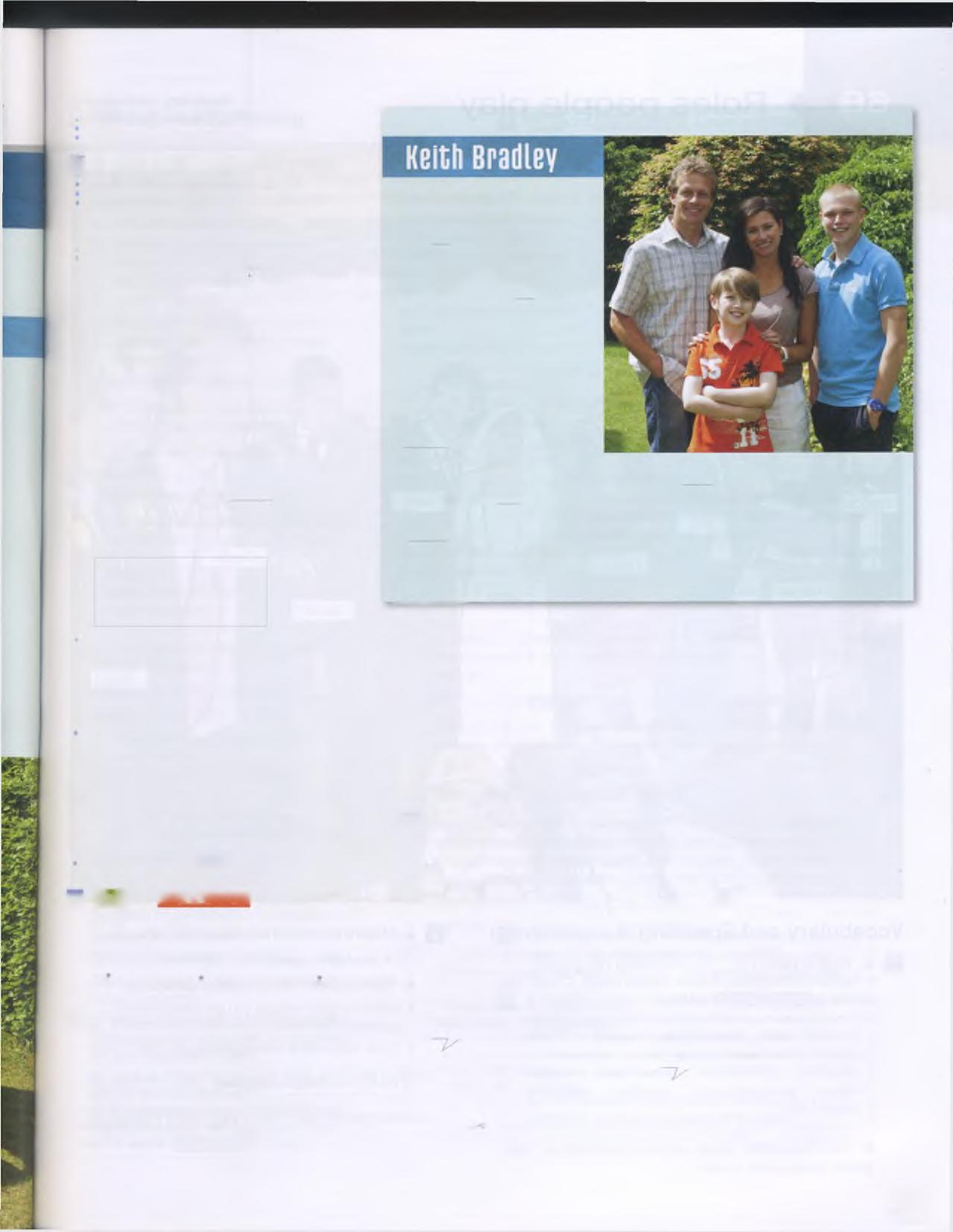
6 minute read
6A Teenagers
aeais*
Q U IC K REVIEW O ffe rs, s u g g e s tio n s and re q u e s ts W ork in g roups. You are going to organise a p a rty at your school. M ake a list o f things to d o and decide w ho d oes w ha t. Use o ffe rs (I’ll. . . , Shall I... ?, etc.), su g g estio ns (Shall we ... ?, Let’s. . . , etc.) and requests (Could you ... ?, Will you ... ?, etc.).
Advertisement
Vocabulary Adjectives (2): character Q a Work in pairs. Which of these words do you know?
Check new words in ■ M l p138.
aggressive ambitious bright confident considerate easy-going helpful honest mature moody organised patient polite reliable rude selfish sensible talented tidy

b Which words in 1a have: a positive meaning (P)? a negative meaning (N)? aggressive N ambitious P
aChoose four adjectives from 1a that describe your character and four that don’t. Write them on a piece of paper. Don’t write them in order. b Work in pairs. Swap lists. Guess which four adjectives describe your partner.
Speaking and Reading
Work in pairs. Discuss these questions. 1 Which is the most difficult to be: a child, a teenager, a middle-aged person, an old person? Why? 2 Which is the most difficult to live with? Why?
KJ
a Look at the headline in the article. Who is ‘the enemy’, do you think? Read the first paragraph only and find out. b Read about Polly Cooper’s family. Who is easier to live with, Debbie or Milly? Why? c Read the article again. Tick the true sentences. Correct the false ones.
different 1 Polly’s two daughters are very similar. 2 Debbie is doing badly at school. 3 Debbie knows what job she wants to do. 4 School work is quite difficult for Milly. 5 Milly is seventeen years old. 6 Polly is worried about both of her daughters.
LIVING WITH THE ENEMY
People often say that living with teenagers is worse than living with any other age group. But is this true? We talked to two parents with teenage children to find out.
Polly Cooper
Of course, it can be really difficult living with teenagers; sometimes they’re rude and they can be quite aggressive. But it isn’t only their age, it’s also the type of people they are. My two daughters are very different.
Debbie’s a typical moody fourteen-year-old and I think she’s more selfish than Milly. I have to be much more patient with her. But Debbie’s got her good points too. She’s a lot tidier than Milly and she’s also more organised. School work is easier for Debbie so her exam results are better. She’s also very ambitious and wants to be a doctor.
Milly’s as confident as Debbie, but she has bigger problems with school work and her exam results are usually worse. However, Milly’s much more considerate than Debbie and she’s less moody. Perhaps that’s because Milly’s two years older than her sister so she’s a bit more mature.
I worry about Milly because she doesn’t know what she wants to do when she leaves school. But I’m more worried about Debbie because she isn’t as happy as Milly. I don’t think parents ever stop worrying about their kids and I’ll certainly miss them both when they leave home.
: HELP WITH GRAMMAR Making comparisons
| | a Look at the comparatives in bold in the article. How do we make comparatives of these adjectives? 1 most one-syllable adjectives [old, etc.) 2 one-syllable adjectives ending in consonant + vowel + consonant (big, etc.) 3 two-syllable adjectives ending in -y (easy, etc.) 4 two-syllable adjectives (selfish, etc.) 5 adjectives with 3 syllables or more (iorganised, etc.) 6 the adjectives good and bad • TIP • The opposite of more is less:
Milly’s less moody than Debbie. b Which word is missing in this • sentence? \ Debbie’s more selfish Milly. c Which of these words in bold mean: a big difference? a small difference?
a lot tidier much more considerate a bit more mature

d Look at these sentences. Then answer questions 1-3. I M illy’s as confident as Debbie. ; Debbie isn’t as happy as Milly. 1 Which sentence means the girls are different? I 2 Which sentence means they are the same? • 3 Do we use the adjective or its comparative form with (not) as ... as? : e Check in E M M S * P139.

| j | |2jJJ-18 IMIMMMVTfifll Listen and practise. Copy the stress and the weak forms of than and as. 9 9 9 Debbie’s more selfish than 0 /San/ Milly.
M illy’s as /s z / confident as /a z / Debbie.
H a Read about Keith Bradley’s family.
Complete the article with the adjective or its comparative form. b Work in pairs. Compare answers. c Do you think it’s easier to live with teenage boys or teenage girls? Why? We’ve got two boys - Carl is eight and Bobby is sixteen. Bobby’s a lot1 more sensible (sensible) than his brother, so I think teenagers are much 2 _________________ (easy) to live with than young children. Bobby’s 3 (helpful) and he isn’t as 4 (selfish) as Carl. Carl is definitely less 5 (patient) than his brother and he isn’t as 6 (polite), but I think that’s just because he’s 7 (young). Bobby’s as 8 (easy-going) as Carl and he’s 9 (confident) than his brother. But Carl’s a bit 10 (bright) than Bobby and his school reports are always much 11 (good). Perhaps Bobby’s reports aren’t as 12 (good) as Carl’s because these days he’s 13 (interested) in girls than his school work!
Q a Write six sentences to compare yourself and a friend or member of your family. Use a lot, much, a bit, (not) as ... as and adjectives from 1a.
Nina’s a bit taller than me. I’m not as organised as she is. b Work in pairs. Tell your partner about you and your friend or member of your family. Give more information if possible.
Get ready ... Get it right!
Q Think about how you can compare your life now to when you were a teenager. (If you are a teenager, think about your life now and your life five years ago.) Make notes on how your personality, appearance and day-to-day life have changed. now - much more confident, life not as stressful... teenager - a bit thinner, less considerate ... BD a Work in groups. Tell the other students about the differences between now and then. Give reasons if possible. >
I ’m much more confident now th an when I was a teenager.
I was a bit thinner when I was a teenager. * ~ v
M y life isn’t as stressful as it was then.
b Tell the class two things about other people in your group.










